Sore eyes? Glasses need cleaning and you’ve misplaced your cleaning cloth? Need something to do whilst desperately hoping your baby will fall asleep on you and then being too scared to move once they’ve passed out and you’ve drank too much coffee to pass out as well? Well, we’re here to help with our latest round up of podcasts from New Books in Anthropology.
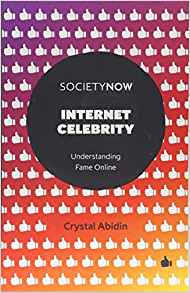 Internet Celebrity. Understanding Fame Online
Internet Celebrity. Understanding Fame Online
by Dr. Crystal Abidin
(Emerald Publishing 2018)
What does it mean to be famous on the Internet? How do people become Internet celebrities, and what can that celebrity be used to do? Dr. Crystal Abidin offers anthropological insight into these questions in her book Internet Celebrity: Understanding Fame Online (Emerald Publishing, 2018). Drawing on case studies from around the world, Dr. Abidin identifies the qualities that contribute to the making of internet celebrity. She explains how some internet celebrities become professional influencers and explores the global implications of the influencer industry. This accessibly written book is aimed at popular audiences and will be indispensable for undergraduate courses about digital culture, for academics who want a clear and cogent introduction to internet celebrity, and for anyone who wants to understand the online worlds in which we increasingly live.
Interview by Danah Dennis
Listen here!
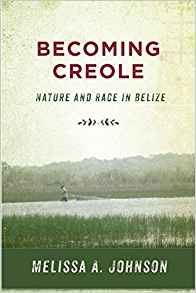 Becoming Creole. Nature and Race in Belize
Becoming Creole. Nature and Race in Belize
by Melissa Johnson
(Rutgers University Press 2018)
Drawing from Sylvia Wynter’s call for rethinking our category of “human”, Melissa Johnson’s ethnography Becoming Creole: Nature and Race in Belize (Rutgers University Press, 2018) demonstrates how entangled people are with the other-than-human that surrounds them. Mud, water, trees, animals and people form assemblages and shape particular identities. These relationships were also intrinsic to social and political contingencies. Johnson notes the historical legacies of slavery and the search for mahogany in the 19th century and the emergence of ecotourism in the 20th century as part of the process of becoming Creole.
Interview by Alejandra Bronfman
Listen here!
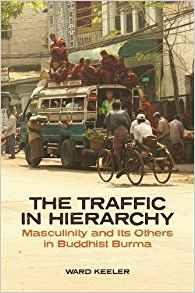 The Traffic in Hierarchy: Masculinity and Its Others in Buddhist Burma
The Traffic in Hierarchy: Masculinity and Its Others in Buddhist Burma
by Ward Keeler
(University of Hawaii Press 2017)
Michael Walzer once began a book with the advice of a former teacher to “always begin negatively”. Tell your readers what you are not going to do and it will relieve their minds, he says. Then they will be more inclined to accept what seems a modest project. Whether or not Ward Keeler had this writing strategy firmly in mind when he wrote the preface to The Traffic in Hierarchy: Masculinity and Its Others in Buddhist Burma (University of Hawaii Press, 2017), it’s the one he adopts, and with the recommended effect. Anticipating that the reader picking up a book on Burma with both “hierarchy” and “masculinity” in its title might be looking for answers to the question of how and why military men dominated the country for so long, and how and why everyone else tolerated them for as long as they did, he tells the reader that he leaves it to them “to speculate as to how such notions as the workings of hierarchy or the location of power ‘above one’s head’ encouraged… members of the former regime to impose control over the nation’s populace with such ferocious complacency”. His own concerns are more immediate and pedestrian, he says. Except, of course, they are much more than that. For as the reader turns the pages they are led through deceptively straightforward descriptions of both street and monastic life, into a theory of hierarchy and a study of masculinity that is at once in conversation with Keeler’s many interlocutors in Burma, and with classics in anthropological inquiry.
Interview by Nick Cheesman
Listen here!
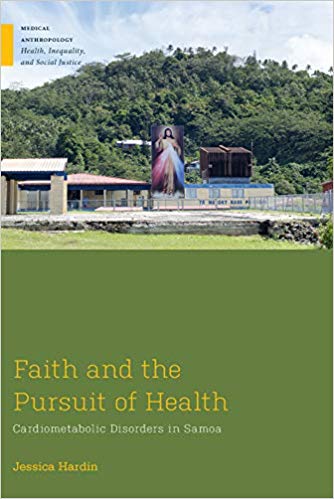 Faith and the Pursuit of Health: Cardiometabolic Disorders in Samoa
Faith and the Pursuit of Health: Cardiometabolic Disorders in Samoa
by Jessica Hardin
(Rutgers University Press 2018)
Jessica Hardin‘s new book Faith and the Pursuit of Health: Cardiometabolic Disorders in Samoa (Rutgers University Press, 2018) explores how Pentecostal Christians manage chronic illness in ways that sheds light on health disparities and social suffering in Samoa, a place where rates of obesity and related cardiometabolic disorders have reached population-wide levels. Pentecostals grapple with how to maintain the health of their congregants in an environment that fosters cardiometabolic disorders. They find ways to manage these forms of sickness and inequality through their churches and the friendships developed within these institutions. Examining how Pentecostal Christianity provides many Samoans with tools to manage day-to-day issues around health and sickness, Jessica Hardin argues for understanding the synergies between how Christianity and biomedicine practice chronicity.
Interview by Dana Greenfield
Listen here!
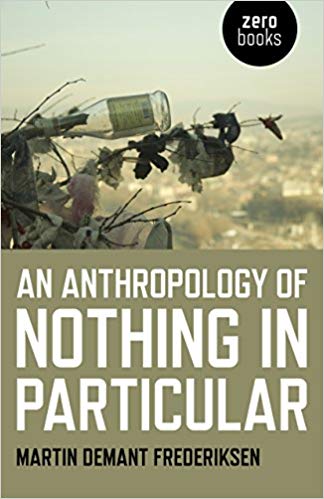 An Anthropology of Nothing in Particular
An Anthropology of Nothing in Particular
by Martin Demant Frederiksen
(Zero Books 2018)
An Anthropology of Nothing in Particular (Zero Books, 2018) is an “exploration of what goes missing when one looks for meaning” (p. 1). The book is both an experimental ethnography and a theoretical treatise on how we can understand and represent absence of meaning. Its author, Martin Demant Frederiksen, approaches the meaningless seriously as an ethnographic and experiential fact, refusing to explain what its ultimate meaning could be.
Interview by Carna Brkovic
Listen here!


